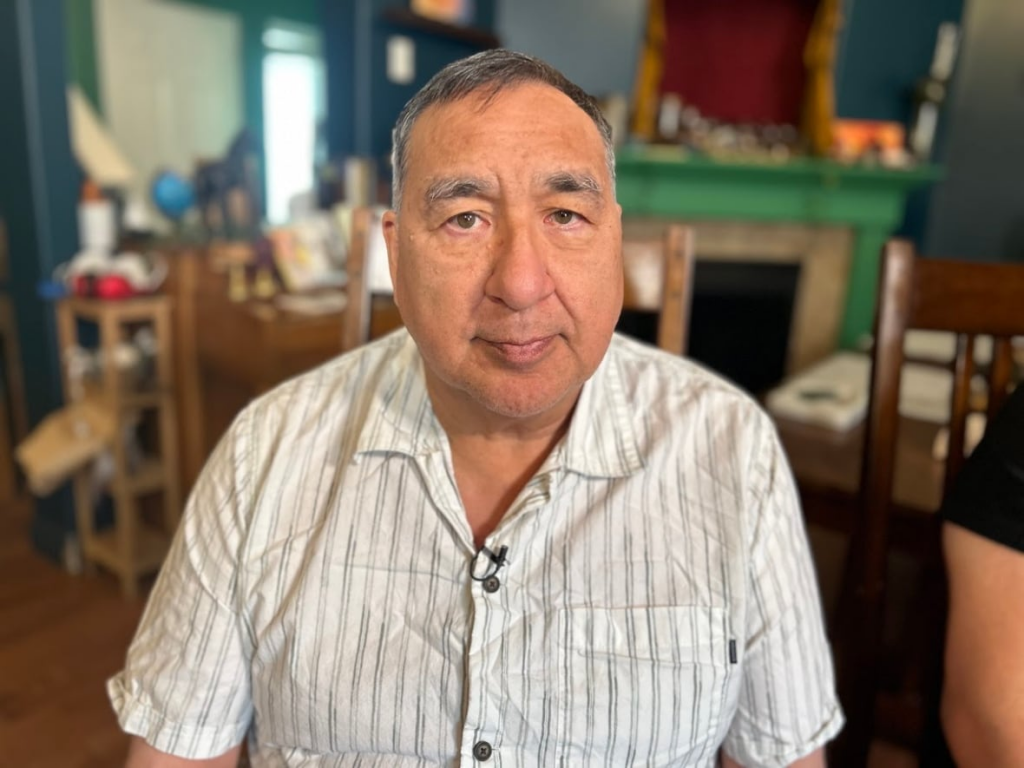This American company is selling ‘ulu-inspired knives.’ Inuit say, that’s not right

Some Inuit are calling out the product for cultural appropriation
A knife with a round blade, curved edges and a handle on top.
An American company says it’s unlike anything “the vast majority” of people have seen.
But Inuit say that’s an ulu, a traditional knife typically used by women, and are calling out the company for cultural appropriation. Uluit are household items regularly used by Inuit across the North.
The company is called Totchop and it advertises a kitchen tool that’s good for parents to cut food into kid-sized bites and is dishwasher safe.
The founders appear to be based in Fort Wayne, Indiana according to social media posts and a patent the company has on a plastic cutting board that comes with the product.

Totchop’s website says their product is “ulu-inspired” and acknowledges its Arctic Indigenous roots, though it never uses the word Inuit.
Ekpak Robinson, an Inuk from Iqaluit, says that’s not right.
“They’re not an Inuit-owned organization and they’re reproducing our tools to make a profit off of it. That’s why we’re mad and that’s why we’re calling it cultural appropriation.”
Robinson started a petition, calling for Totchop to stop selling the ulu-inspired knife. That petition has over 200 signatures with comments from across the North accusing the company of stealing from Inuit.
Totchop did not respond to CBC’s requests for an interview.
Robinson said that he and some friends have messaged the company on TikTok and Facebook and were blocked.
“If they don’t want to talk to us, then maybe this petition will help them realize how serious we are about this,” he said.
It’s not the first time a southern company has taken an Inuit design, but pushback on the new company is raising questions about how to protect Indigenous knowledge.
‘That is what keeps our culture alive’
Joe Karetak, an Inuk elder from Arviat, Nunavut, said the least they can do is ask permission.
“If I was going to make something and I was going to use somebody else’s design other than mine, it would be common courtesy if I was to go over and ask, ‘would you allow me to do this?’ … And if they didn’t approve, I couldn’t do it,” he said.

Karetak said that’s how it used to be, but it’s becoming more challenging.
“It’s really hard to protect the interest and integrity of who first designed this and I don’t think we’ve tried to control that.”
Nancy Etok, the interim president of Pauktuutit Inuit Women of Canada, said that’s something her organization is advocating for.
She said non-Inuit companies taking traditional designs should be consulting with Inuit groups and support Inuit artists and communities.
“These kinds of artifacts, the ulu and anything else that was invented by Inuit, that is what keeps our culture alive,” she said. “Mass producing it, it will shadow the real purpose and real importance of what the ulu means to Inuit.”
Etok said that it’s a work in progress, but through UNDRIP Canada has committed to creating national legislation protecting Indigenous knowledge and artifacts.
But intellectual property lawyers say that’s hard to do.
Meika Ellis, an intellectual property lawyer in Ottawa, said there are several examples of businesses monetizing Indigenous knowledge without appropriate permissions — especially tourist shops selling trinkets like mock totems or moccasins.
If they don’t fall within the defined regime of the Trademarks Act, there are no legal protections.
But Ellis said consumers should be more informed about the ethics of their purchases.
“You should ask yourself morally if someone took your design and then put their own spin on it and sold it, would you be OK with that? And if you wouldn’t be OK with that, then you shouldn’t be OK with someone taking an Indigenous design without permissions.”
Ulu makers respect free market
On its website, Totchop writes that it doesn’t want to compete against Indigenous craftspeople. Some Inuit ulu makers say it is creating competition, but they know the value of their authentic products.
Ken Mackay, Karetak’s son-in-law, makes his living selling uluit.
Mackay said non-Inuit companies do take up space in the market but that mass producing uluit loses the uniqueness of those that are handcrafted.
Dino Bruce, another ulu maker in Coral Harbour, Nunavut, said it can be difficult to compete with producers in cities with greater access to materials, technology and shipping.
He said his first thought is that it’s not fair, but he respects that it’s a free market and each company is entitled to let buyers decide.
Related stories from around the North:
Canada: Debate in Arctic Canada over who should sell traditional crafts, CBC News
Norway: Norway sends song with Sami joik to Eurovision Song Contest, The Independent Barents Observer
United Kingdom: U.K. fashion label apologizes for copied Inuit design, Radio Canada International



